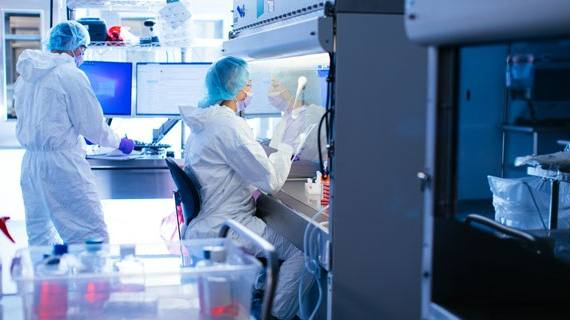-
Research
RegenBio Summit: Understanding regulations for bringing breakthrough treatments to patients

Learn about navigating regulatory pathways that advance promising biotherapies to daily patient care at RegenBio Summit: Transforming Next-Gen Biotherapeutics 2024. Peter Marks, M.D., Ph.D., director of the Center for Biologics Evaluation and Research within the Food and Drug Administration (FDA), will deliver a keynote address about guiding the development of new cell, gene and tissue therapies. Dr. Marks leads the Center within FDA that is responsible for ensuring that biological products are safe, effective and available to those who need them.
Register now for the event that will bring together scientists, physicians, healthcare staff, entrepreneurs, students and industry members from Dec. 9 to 11 at the Ponte Vedra Inn & Club in Ponte Vedra Beach, Florida.
"FDA views cell and gene therapy products as an excellent opportunity to expedite the delivery of potentially life-saving therapies to patients with rare diseases. The promise of these technologies is enormous, putting potentially transformative treatments for many rare diseases within reach," says Dr. Marks. "The pace of the development and availability of scientific discoveries has accelerated in recent years, introducing a promising new class of medicine that did not seem possible even a short time ago."
Dr. Marks' presentation will be of value to researchers interested in commercializing discoveries, product developers, healthcare professionals, entrepreneurs and students who want to learn more about the regulatory landscape.
Programs to expedite biotherapies
Biotherapies are made from living sources such as human cells or tissues and include genetically modified cell and gene therapies. New biological therapies must meet strict regulatory guidelines that ensure product safety, identity, strength (including potency), quality and purity before they are given to participants in clinical trials.
Recognizing patient need, the FDA has introduced programs to help accelerate the development of new therapies, such as The Support for clinical Trials Advancing Rare disease Therapeutics (START) Pilot Program. This program enables frequent communication between the FDA and the sponsor of the clinical trial to discuss drug development issues such as clinical study design, control groups and fine-tuning the enrollment of clinical trial participants
The Rare Disease Endpoint Advancement Pilot Program is another example of an FDA initiative designed to promote innovation. The goal is to advance development and timely approval of drug and biologic products for rare diseases. The FDA has several additional expedited programs for eligible products that are intended to treat serious conditions. Examples include Fast Track, Breakthrough Therapy, Regenerative Medicine Advance Therapy, and Priority Review designations.
"Facilitating the development of innovative therapies to address unmet medical needs is a high priority for FDA. Our goal is to help bring new innovations and advances to patients who need them faster and more efficiently by educating sponsors and patients about the regulations to help ensure the appropriate oversight and safe development of these therapies," says Dr. Marks.
Due to unprecedented growth and innovation in cell and gene therapies, the FDA has created a new "super office." It has hired additional staff to help ensure that FDA is positioned to address the pace of the development and availability of new biologic technologies.
"The structure of the super office includes six new offices allowing a greater capacity for current and future growth while aligning teams and functions in a way that promotes efficiencies in the long term," says Dr. Marks. "This change enables the FDA to meet the challenges facing public health."
Challenges to overcome
Manufacturing challenges such as inconsistent product quality could impact the availability of some new cell and gene therapies. This is known as product variability. Another issue is lack of harmonization. As an example, cell or gene therapy products may be available internationally under different regulatory frameworks. As a result, drug identity, strength, quality and purity may differ.
"There are no uniform global standards for the evaluation and regulation of cell and gene therapy products. We believe that harmonization efforts in this area can help facilitate more efficient clinical development," says Dr. Marks. "To that end, FDA supports work toward global regulatory convergence and, ultimately, global harmonization of regulations for these products."
Learning opportunities at the RegenBio Summit
Besides the keynote address, RegenBio Summit: Transforming Next-Gen Biotherapeutics 2024 will offer sessions on gene editing, tissue engineering and entrepreneurship. Mayo Clinic will also share its blueprint for biomanufacturing early-stage therapeutics that could seamlessly be transferred to industry collaborators to bring therapies to market for broader patient access.
"Attending RegenBio Summit is a phenomenal opportunity to hear from Mayo Clinic experts and also to build industry collaborations, learn about entrepreneurial pathways, discuss standards for new therapies and train the future workforce," says Saranya Wyles, M.D., Ph.D., associate director for education in Mayo Clinic's Center for Regenerative Biotherapeutics and course director for the RegenBio Summit.
The Center for Regenerative Biotherapeutics is sponsoring the summit as part of its commitment to bringing new biologic medicines to patients and to training the future biomanufacturing workforce.
In addition to Dr. Marks, the other keynote speakers at the summit will be:
M. Peter Marinkovic, M.D., associate professor of dermatology, Stanford University, who will speak about his pioneering research in an FDA-approved topical gene therapy for autoimmune blistering diseases.
Birgit Schultes, Ph.D., senior vice president, Intellia Therapeutics Inc., who will discuss preclinical research using the CRISPR Cas-9 gene editing tool to generate cell therapies for cancer and autoimmune diseases.
The summit also will offer plenaries featuring Mayo Clinic experts, networking events and poster sessions. Visit the summit website to register and to see the list of speakers and breakout sessions.
###
Related stories:
RegenBio Summit: Healing disease at its molecular roots
RegenBio Summit: Could molecular scissors heal disease?







